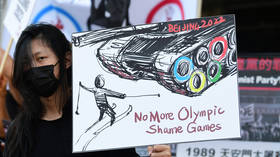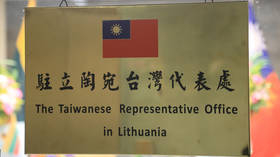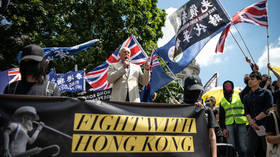What Country Does the Schrock Family Line Come From
A recent article published by Joshua Kurlantzick in the Quango of Foreign Relations dissects what he describes every bit the declining public image of Cathay. At first glance, he isn't incorrect. Over the past two years, positive opinion of Communist china has indeed collapsed in Western and The states-aligned countries. But the reasons he states for why that has happened are equally disingenuous as they are outright false. The piece goes off on a tirade listing all the means he thinks People's republic of china is bad. From Covid-19, to so-called "wolf warrior diplomacy," to the Belt & Road Initiative (BRI) "beingness a debt-trap," to "aggressive and coercive behavior," to Chinese vaccines plainly existence "ineffective" so on.
What is curious about these reasons is that they do not seem to resemble actual facts as much every bit anti-China cliches which are commonplace in American discourse, irrespective of whether they're true or not. For example, he claims that "BRI is stalling" – only in that location is no testify of this happening, with much to the reverse.

The author obliviously fails to mention what is in fact truly going on hither concerning opinions of China in the West: The United States is and has been, in conjunction with its closest partners, waging a propaganda state of war against Beijing in society to legitimize its goals of containing China.
If you believe this conventional narrative, China is to be disliked now considering all of a sudden it i day started doing bad things, such as those mentioned above, and became an "aggressive" country, alienating anybody with its "wolf warrior diplomacy." It is as if this randomly happened for no reason, and other countries are perfectly vindicated in their response to information technology.
At least that's how the average Westerner has been conditioned to understand it. They would not believe that China is finer the same land it has been since 1949, with the same ruling party, with highly consistent territorial claims and goals, even if it has different policies to accomplish those, but only that it of a sudden started "changing for the worse" under Xi Jinping who set information technology on a class for "earth domination."
What Westerners might never be inclined to call up is that they take been manipulated into these beliefs by a deliberate U.s.a. campaign to alter public stance against China, to demonize, ignominy and isolate the land, to derail its international engagement and justify Washington's new priorities against information technology.
However, that, of course, is exactly what has happened. America's strange policy engine relies on a playbook which is known as "manufacturing consent" – the weaponization of the resources of the country to coordinate experts, recollect tanks and journalists to focus attending on problems which subsequently sway public opinion to create organic support for Washington's policy preferences.
Information technology is a strategy designed to create a "self-fulfilling prophecy" by masking aggression nether the guise of inciting a "moral example" confronting the target in question. This is oft done using the mantra of human rights, exploiting and manipulating people's goodwill through the theatrical orchestration of crisis, and subsequently masking the intended foreign policy objectives as a justified deed of benevolence and "business." It'due south what the Us has done in the build-up to every war, and information technology'southward what they are doing at present regarding China.
Information technology was in 2018 that America, under the Trump administration, launched its public opinion war against Red china. Afterward having "dealt" with the Democratic people's republic of korea issue, the White Firm turned its focus on Beijing and unleashed a swathe of initiatives against information technology. It was that year that the national security strategy labeled China a "geopolitical competitor" and launched wars against Chinese trade and engineering science. In conjunction, the march to manufacture public consent confronting China began. It was no matter of coincidence that allegations and coverage regarding Xinjiang all of a sudden began to emerge. There is bear witness showing how the wheels were placed in motion here.

The Victims of Communism grouping, a vitriolic right-wing remember tank in Washington, reported that its donations all of a sudden surged from $two meg to $12 million in 2018. What was going on? Where did the sudden influx of donations come from? And more than importantly: Why? The answer was Washington's new focus on Mainland china. This organization of a sudden went from something obscure into an important voice advocating anti-China content on Xinjiang through the scholar Adrian Zenz. Other hawkish retrieve tanks, such as the Australian Strategic Policy Establish in Canberra, which receives Us Country Department funding, besides rose to prominence, publishing allegations of "forced labor." Again, Xinjiang was the focus, and Western mainstream media followed in tandem. The campaign to demonize Beijing was underway.
The Trump administration and so used the Covid-19 pandemic to build on this new consensus, scapegoating China for an declared cover-upward. Utilizing this "atrocity propaganda" and jibes about the "China virus" was designed to whip upwards paranoia and fearfulness against all things China-related. Every Chinese visitor, organisation, or individual were vehicles for espionage, such as Huawei and the Confucius Institutes. Governments who sought to engage with Beijing favorably were denounced, lobbied, and stiff-armed into irresolute their minds.
This is the fine art of "manufacturing consent" – the US uses its extensive networks to big upwardly dissidents, coordinate mainstream media, ready the agenda, poisonous substance civil society by weaponizing human rights activists against the target country past giving them preferential coverage and resources (whilst ignoring atrocities elsewhere), and create a cocky-sustaining narrative that conforms to its own foreign policy goals.
The U.s.a. conducted an active and successful sledgehammer operation on Western opinion of People's republic of china. When Beijing has the temerity to hit dorsum at this propaganda war confronting information technology, then, insidiously, as y'all tin can see with articles like the Quango of Foreign Relations, its ain analysts arraign Beijing for the geopolitical context they created.

The discourse of "wolf warrior diplomacy" in this light is dishonest, misleading, and unhelpful because information technology frames People's republic of china as the perpetrator when it is merely reacting to hostility weaponized confronting it. Beijing is scorned for being forced to make political responses to hostile moves by the US. For example, by the kidnapping of Huawei executive Meng Wanzhou in Canada in 2018 and forcing China to respond in plough, Beijing is then framed as the aggressor and "commits hostage diplomacy." Too, Cathay'southward positions on Taiwan, the South Red china Sea, Hong Kong, and so on, are not new at all, but America has gaslighted these issues by moving the goalposts on them and seeking to strength Beijing's hand.
In a nutshell, at that place is scant analysis in the West as to how America's active and deliberative stoking of geopolitical disharmonize creates such hostility, or any belongings Washington to account for its global propaganda.
However, its cold state of war against China is very much real. It can but truly be understood in the framework of the rivalry between the ii powers and appreciating US foreign policy in the dynamics of its standing want for sole ability, and not the facade of a righteous and heroic nation having "concerns" nearly certain issues. Such articles as Kurlantzickin'southward ultimately insult the public's intelligence, who are fed an endless array of lies didactics them to hate and fear Mainland china. It's time to wake upwards to the truth.
The statements, views and opinions expressed in this column are solely those of the author and do not necessarily represent those of RT.
pierceparawascrack.blogspot.com
Source: https://www.rt.com/op-ed/547290-chinas-global-image-worse/
0 Response to "What Country Does the Schrock Family Line Come From"
Post a Comment